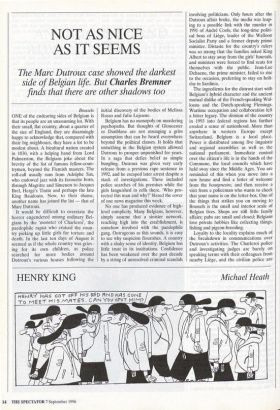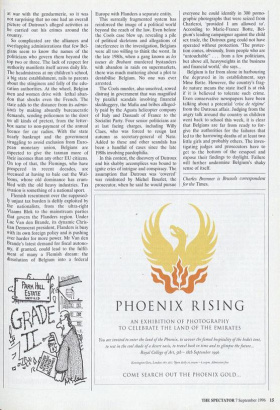NOT AS NICE AS IT SEEMS
The Marc Dutroux case showed the darkest side of Belgian life. But Charles Bremner finds that there are other shadows too
Brussels ONE of the endearing sides of Belgium is that its people are an unassuming lot. With their small, flat country, about a quarter of the size of England, they are disarmingly happy to acknowledge that, compared with their big neighbours, they have a lot to be modest about. A bicultural nation created in 1830, with a helping hand from Lord Palmerston, the Belgians joke about the brevity of the list of famous fellow-coun- trymen, beyond the Flemish masters. The roll-call usually runs from Adolphe Sax, who endowed jazz with its favourite horn, through Magritte and Simenon to Jacques Brel, Herge's Tintin and perhaps the late King Baudouin. Now, to their shame, another name has joined the list — that of Marc Dutroux.
It would be difficult to overstate the horror engendered among ordinary Bel- gians by the 'monster of Charleroi', the paedophile rapist who cruised the coun- try picking up little girls for torture and death. In the last ten days of August it seemed as if the whole country was griev- ing for its own children, as police searched for more bodies around Dutroux's various houses following the initial discovery of the bodies of Melissa Russo and Julie Lejeune.
Belgium has no monopoly on murdering psychopaths. But thoughts of Gloucester or Dunblane are not assuaging a grim assumption that can be heard everywhere beyond the political classes. It holds that something in the Belgian system allowed Dutroux to prosper unpunished for years. In a saga that defies belief as simple bungling, Dutroux was given very early release from a previous rape sentence in 1992, and he escaped later arrest despite a stack of investigations. These included police searches of his premises while the girls languished in cells there. 'Who pro- tected this man and why?' blared the cover of one news magazine this week.
No one has produced evidence of high- level complicity. Many Belgians, however, simply assume that a sinister network, reaching high into the establishment, is somehow involved with the paedophile gang. Outrageous as this sounds, it is easy to see why suspicion flourishes. A country with a shaky sense of identity, Belgium has little trust in its institutions. Confidence has been weakened over the past decade by a string of unresolved criminal scandals involving politicians. Only hours after the Dutroux affair broke, the media was leap- ing to a possible link with the murder in 1991 of Andre Cools, the long-time politi- cal boss of Liege, leader of the Walloon Socialist Party and a former deputy prime minister. Distaste for the country's rulers was so strong that the families asked King Albert to stay away from the girls' funerals, and ministers were forced to find seats for themselves with the public. Jean-Luc Dehaene, the prime minister, failed to rise to the occasion, preferring to stay on holi- day in Sardinia.
The ingredients for the distrust start with Belgium's hybrid character and the ancient mutual dislike of the French-speaking Wal- loons and the Dutch-speaking Flemings. Wartime occupation and collaboration left a bitter legacy. The division of the country in 1993 into federal regions has further eroded a sense of nationhood. More than anywhere in western Europe except Switzerland, Belgium is a local place. Power is distributed among five linguistic and regional assemblies as well as the national parliament. Immediate control over the citizen's life is in the hands of the Commune, the local councils which have held sway since the Middle Ages. You are reminded of this when you move into a new house and find a letter of welcome from the bourgmestre, and then receive a visit from a policeman who wants to check that your name is on the letter-box. One of the things that strikes you on moving to Brussels is the small and interior scale of Belgian lives. Shops are still little family affairs; pubs are small and closed; Belgians love private hobbies like collecting things, fishing and pigeon-breeding.
Loyalty to the locality explains much of the breakdown in communications over Dutroux's activities. The Charleroi police and investigating judges are barely on speaking terms with their colleagues from nearby Liege, and the civilian police are
at war with the gendarmerie, so it was not surprising that no one had an overall picture of Dutroux's alleged activities as he carried out his crimes around the country.
So complicated are the alliances and overlapping administrations that few Bel- gians seem to know the names of the Politicians who govern them beyond the top two or three. The lack of respect for authority manifests itself across daily life. The headmistress at my children's school, a big state establishment, rails to parents about the stinginess and folly of the edu- cation authorities. At the wheel, Belgian Men and women drive with lethal aban- don that shocks even the French. The state adds to the distance from its admin- istres by making absurdly bureaucratic demands, sending policemen to the door on all kinds of pretext, from the letter- box name to non-payment of the annual licence for car radios. With the state nearly bankrupt and the government struggling to avoid exclusion from Euro- pean monetary union, Belgians are expected to give the taxman more of their incomes than any other EU citizens. On top of that, the Flemings, who have prospered in recent decades, are incensed at having to bale out the Wal- loons, whose old dominance has crum- bled with the old heavy industries. Tax evasion is something of a national sport. Flemish resentment over the supposed- ly unjust tax burden is deftly exploited by the nationalists, from the ultra-right Vlaams Blok to the mainstream parties that govern the Flanders region. Under Luc Van den Brande, its dynamic Chris- tian Democrat president, Flanders is busy with its own foreign policy and is pushing ever harder for more power. Mr Van den Brande's latest demand for fiscal autono- my, if granted, could lead to the fulfil- ment of many a Flemish dream: the dissolution of Belgium into a federal
Europe with Flanders a separate entity. This surreally fragmented system has reinforced the image of a political world beyond the reach of the law. Even before the Cools case blew up, revealing a pile of political skeletons and allegations of interference in the investigation, Belgians were all too willing to think the worst. In the late 1980s, when a gang known as les tueurs de Brabant murdered bystanders with abandon in raids on supermarkets, there was much muttering about a plot to destabilise Belgium. No one was ever arrested.
The Cools murder, also unsolved, sowed distrust in government that was magnified by parallel scandals involving financial skulduggery, the Mafia and bribes alleged- ly paid by the Agusta helicopter company of Italy and Dassault of France to the Socialist Party. Four senior politicians are at last facing charges, including Willy Claes, who was forced to resign last autumn as secretary-general of Nato. Added to these and other scandals has been a handful of cases since the late 1980s involving paedophilia.
In this context, the discovery of Dutroux and his shabby accomplices was bound to ignite cries of intrigue and conspiracy. The assumption that Dutroux was `covered' was reinforced by Michel Bourlet, the prosecutor, when he said he would pursue everyone he could identify in 300 porno- graphic photographs that were seized from Charleroi, `provided I am allowed to'. According to Marie-France Botte, Bel- gium's leading campaigner against the child sex trade, the Dutroux gang could not have. operated without protection. `The protec- tion comes, obviously, from people who are "untouchable" . .. from a few politicians, but above all, heavyweights in the business and financial world,' she says.
Belgium is far from alone in harbouring the depraved in its establishment, says Mme Botte. However, the country's frag- ile nature means the state itself is at risk if it is believed to tolerate such crime. Even conservative newspapers have been talking about a potential 'crise de regime' from the Dutroux affair. Judging from the angry talk around the country as children went back to school this week, it is clear that Belgians are far from ready to for- give the authorities for the failures that led to the harrowing deaths of at least two little girls and probably others. The inves- tigating judges and prosecutors have to get to the bottom of the cesspool and expose their findings to daylight. Failure will further undermine Belgium's shaky sense of itself.
Charles Bremner is Brussels correspondent for the Times.



























































 Previous page
Previous page